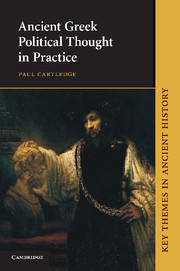Book contents
- Frontmatter
- Contents
- Preface
- Acknowledgements
- Timeline
- CHAPTERS AND NARRATIVES
- 1 Meaning in context: how to write a history of Greek political thought
- 2 The Greek invention of the polis, of politics and of the political
- Narrative I The prehistoric and protohistoric Greek world, c. 1300–750 BCE
- Narrative II The archaic Greek world, c. 750–500 BCE
- Narrative III The classical Greek world I, c. 500–400 BCE
- 6 The human measure: the Greek invention of political theory, c. 500–400 BCE
- 7 The trial of Socrates, 399 BCE
- Narrative IV The classical Greek world II, c. 400–300 BCE
- Narrative V The Hellenistic Greek world, c. 300–30 BCE
- Narrative VI ‘Graecia capta’ (‘Greece conquered’), c. 146 BCE – CE 120
- APPENDIX I Selected texts and documents
- APPENDIX II The ‘Old Oligarch’: a close reading
- Bibliographical essay
- References
- Index
6 - The human measure: the Greek invention of political theory, c. 500–400 BCE
Published online by Cambridge University Press: 05 June 2012
- Frontmatter
- Contents
- Preface
- Acknowledgements
- Timeline
- CHAPTERS AND NARRATIVES
- 1 Meaning in context: how to write a history of Greek political thought
- 2 The Greek invention of the polis, of politics and of the political
- Narrative I The prehistoric and protohistoric Greek world, c. 1300–750 BCE
- Narrative II The archaic Greek world, c. 750–500 BCE
- Narrative III The classical Greek world I, c. 500–400 BCE
- 6 The human measure: the Greek invention of political theory, c. 500–400 BCE
- 7 The trial of Socrates, 399 BCE
- Narrative IV The classical Greek world II, c. 400–300 BCE
- Narrative V The Hellenistic Greek world, c. 300–30 BCE
- Narrative VI ‘Graecia capta’ (‘Greece conquered’), c. 146 BCE – CE 120
- APPENDIX I Selected texts and documents
- APPENDIX II The ‘Old Oligarch’: a close reading
- Bibliographical essay
- References
- Index
Summary
They that are discontented under a monarchy call it tyranny, and they that are displeased with aristocracy call it oligarchy; so also, they which find themselves grieved under a democracy call it anarchy.
(Thomas Hobbes, Leviathan, 1651)Debates about government and the state go back to the very beginnings of extant Greek literature in c. 700. What concerns me here, though, is a narrower and sharper definition of political theories properly so called, according to which they ‘are, by and large, articulate, systematic, and explicit versions of the unarticulated, more or less systematic and implicit interpretations, through which plain men and women understand this experience of the actions of others in a way that enables them to respond to it in their own actions’ (MacIntyre 1983).
The moment dividing such articulate, theoretical systematisation from implicit practical interpretation is hard to pin down precisely, but its terminus post quem (earliest possible date of invention) was the pioneering intellectual activity, from the first half of the sixth century on, of the Milesian School of historia (‘enquiry’; historiê in Ionic Greek dialect), represented above all by Thales, Anaximenes and Anaximander, all of Miletus. In Homer we found political thought, of a sort, but no polis to provide its context. In Hesiod we found both the polis and a more developed form – and in a more precise sense – of political thought. The beginnings of the transition from political thought to theory may perhaps be traced as early as the Athenian Solon in c. 600 bce (see Vlastos 1946, Irwin 2005 and Lewis 2006), though he looks backwards rather than forwards, partly for intellectual, and partly for political, reasons.
- Type
- Chapter
- Information
- Ancient Greek Political Thought in Practice , pp. 69 - 75Publisher: Cambridge University PressPrint publication year: 2009
- 1
- Cited by



